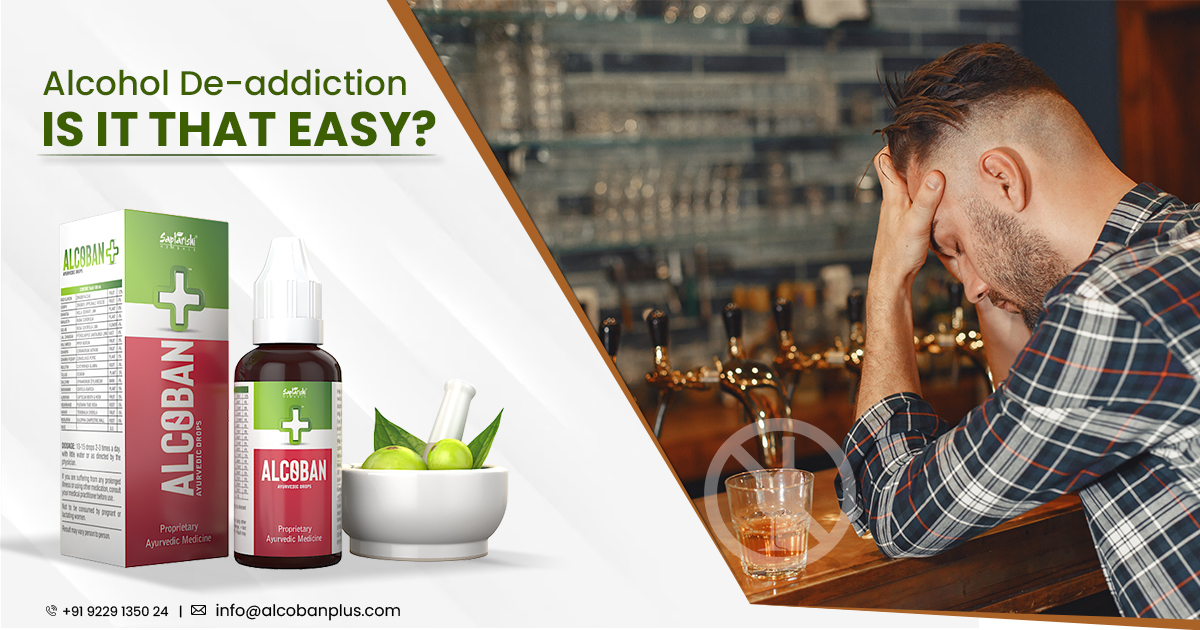Alcobanplus

Alcohol de-addiction, commonly known as overcoming alcohol addiction, is a complex and challenging journey that millions of individuals embark on every year. While the prospect of breaking free from alcohol's grip may sound promising, the reality is that the path to recovery is not always a straightforward one.
In this blog, we will examine the various challenges individuals face when trying to overcome alcohol addiction and shed light on how to combat these challenges to find the truth behind the question: Is alcohol de-addiction that easy?
Chronic alcohol abuse can lead to severe health problems, such as liver disease (e.g., cirrhosis), cardiovascular issues, neurological disorders, gastrointestinal complications, and an increased risk of certain cancers.
Alcoholism often co-occurs with mental health disorders, such as depression, anxiety, and other mood disorders.
One of the first hurdles on the road to recovery is recognizing the presence of alcohol addiction. Denial is a strong mechanism that many individuals with alcoholism employ. It is an invisible barrier that prevents them from acknowledging the severity of their problem.
The societal stigma surrounding addiction can be a significant barrier for those seeking help when they need it the most. The misconception about addiction, discrimination, and isolation often becomes a hurdle to seeking help.
The compulsive and harmful behaviors associated with addiction can lead to a breakdown of trust, communication, and intimacy within relationships. As the addiction takes center stage, loved ones may feel neglected, abandoned, or burdened by the responsibilities caused by the addicted person's behavior.
Relapses are a common part of the recovery journey, but they can be discouraging. Relapse poses significant challenges for individuals in addiction recovery, as it can evoke guilt, shame, and discouragement. The struggle to regain sobriety is compounded by a sense of failure and loss of confidence.
A robust support system can make a difference for someone trying to overcome alcohol addiction. The family, friends, and community support in sustaining recovery is of great significance.
Triggers and temptations are inevitable in daily life. Staying away from places where alcohol is readily available, replacing alcohol with healthier drinks like various herbal teas, and engaging in physical activities and favorite sports help in overcoming the triggers.
The process of de-addiction can be emotionally taxing. The significance of self-compassion and self-forgiveness is vital components of healing.
Ayurvedic anti-addiction or nasha mukti medicines are formulated based on the principles of Ayurveda. These medicines aim to help individuals overcome various addictions, including alcohol, drugs, and smoking.
Ayurvedic anti-addiction medicines often start with detoxification to remove the accumulated toxins from the body. This process helps to cleanse the body and prepares it for further treatment.
Ayurvedic medicines use a wide range of natural herbs and plants with medicinal properties to support the body's healing process. These herbal formulations help to nourish and strengthen the body, reduce cravings, and improve mental clarity.
Recognizing and celebrating progress, no matter how small, is crucial for motivation. Acknowledge the milestones and celebrate the victories in resisting alcohol during the recovery journey.
In this blog, we have uncovered the reality behind the question, "Is alcohol de-addiction really that easy?" The path to deaddiction may be withered with obstacles, but it is undeniably worth traversing. With the right support, determination, and professional assistance, breaking free from alcohol addiction is achievable.
